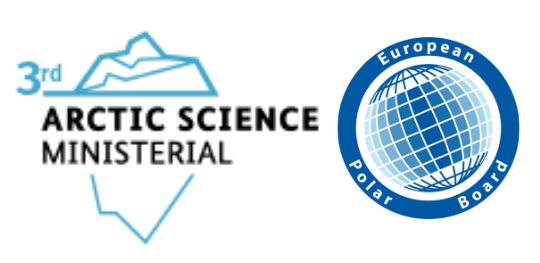EPB Webinars

ASM3 webinar series
In cooperation with organisers of the 3rd Arctic Science Ministerial (ASM3) Iceland and Japan, the EPB hosts a webinar series. The webinar series is designed to increase transparency of the ASM3 science process and to provide additional opportunities for scientists, Indigenous Peoples and stakeholders to further engage with the science and proposed actions leading up to ASM3 in May 2021.
For more details on the ASM3 webinar series, please click here.
EPB-APECS webinar series
In partnership with the Association of Polar Early Career Scientists (APECS), the EPB organises a series of webinars that aim to connect polar research and policy. The webinars are aimed at polar researchers, policymakers and other professionals at all career stages.
Recordings of all EPB-APECS webinars can be viewed via the EPB YouTube channel.
Chloe Hill - The EGU Horizon Geoscience survey and EU research programmes
For the fifth webinar in the EPB-APECS series, Chloe Hill, Policy Officer at the European Geosciences Union (EGU), presented the results of the Horizon Geoscience survey. The survey, conducted by the EGU and the European Federation of Geologists (EFG), evaluated the perceived success of the EU's Horizon 2020 research programme among geoscientists, and gathered feedback on how the next programme, Horizon Europe, could be different. The webinar highlights polar-specific responses and outcomes from the survey, as well as broader geoscience themes.
For a summary of key findings from the Horizon Geoscience survey, visit https://cdn.egu.eu/media/filer_public/c0/73/c07395cd-b6c4-421e-acd2-dd3435e2eaf6/h2020_report.pdf
You can view a recording of the webinar here. Slides from the webinar can be accessed here.
Kristina Bär - The EU Arctic Cluster
For the fourth EPB-APECS webinar, held on Tuesday 5th June 2018, Kristina Bär, EU-PolarNet Communications Officer, introduced the EU Arctic Cluster and how it is bringing together EU-funded polar research projects to jointly maximise their impact.
The EU Arctic Cluster is a network of Horizon 2020 and a Framework Programme 7 funded Arctic projects, with the European Polar Board (EPB) as an affiliated partner. Currently it comprises eight projects: APPLICATE, ARICE, Blue-Action, EU-PolarNet, ICE-ARC, iCUPE, INTAROS, INTERACT, and NUNATARYUK. The Cluster thus merges a broad spectrum of research and coordination activities - ranging from the most up-to-date findings on permafrost and sea ice, from enhancing observation to improving predictions, and from networking research stations to coordinating access to icebreakers.
The EU Arctic Cluster's objective is to bring the insights from various areas of expertise together in order to provide one entry point to EU funded Arctic research. Jointly the Cluster aims to provide policy-relevant information and support the EU in implementing its integrated policy for the Arctic.
You can view a recording of the webinar here. Slides from the webinar can be accessed here.
Jennifer Ngo-Anh - ESA's Human Research Programme
For the third EPB-APECS webinar, held on 15th March 2018, Jennifer Ngo-Anh, Head of the Human Research Office at the European Space Agency (ESA), gave an overview of ESA's Human Research Programme, including their work at Concordia research station in Antarctica.
You can view a recording of the webinar here. Slides from the webinar can be accessed here.
Timo Koivurova - An introduction to the Arctic Council
The second EPB-APECS webinar, held on Thursday 2nd November 2017, saw Timo Koivurova, Director and Research Professor at the Arctic Centre, University of Lapland, present “An introduction to the Arctic Council”.
The Arctic Council is the leading intergovernmental forum promoting cooperation, coordination and interaction among the Arctic States, Arctic indigenous communities, and other Arctic inhabitants. Giving an overview of its structure, including Members, Permanent Participants, and Working Groups, this webinar acts as an introduction to the Arctic Council, providing information on its workings, issues of focus, recent achievements, and advice on how researchers can participate in its activities.
You can view a recording of the webinar here. Slides from the webinar can be accessed here.
Yves Frenot - The Antarctic Treaty and the protection of the environment
The first EPB-APECS webinar, on "The Antarctic Treaty and the protection of the environment", was given by Yves Frenot, Director of the Insitut Polaire Français Paul-Emile Victor (IPEV), on 26th October 2017.
The Antarctic Treaty, signed in Washington on December 1, 1959, has the purpose to ensure that "in the interest of all mankind that Antarctica shall continue for ever to be used exclusively for peaceful purposes and shall not become the scene or object of international discord". Signed in 1991, the Protocol on Environmental Protection (the Madrid Protocol) to the Treaty, designates Antarctica as “a natural reserve, devoted to peace and science”. This webinar gives an overview of how the Antarctic Treaty and its Madrid Protocol work, and how the Treaty system is used to protect the Antarctic environment.
You can view a recording of this webinar here. Slides from the webinar can be accessed here.


